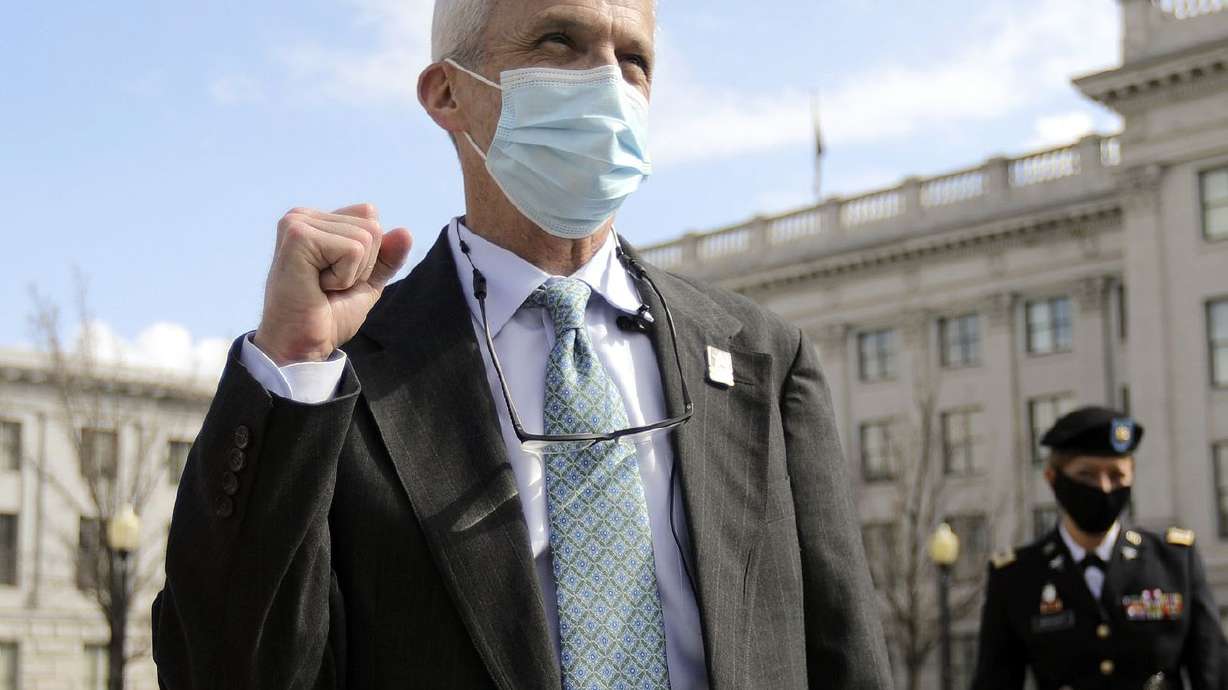Estimated read time: 4-5 minutes
This archived news story is available only for your personal, non-commercial use. Information in the story may be outdated or superseded by additional information. Reading or replaying the story in its archived form does not constitute a republication of the story.
SALT LAKE CITY — At an age when most people would be retiring from the military, Dr. John Mitchell, 61, is joining up for the second time in his life as a way of showing gratitude for the opportunity afforded to him years ago in the U.S. Army that led to a long career in medicine.
On Wednesday, Mitchell — a cardiothoracic surgeon at Utah Valley Hospital in Provo — took the military oath to serve in the U.S. Army Reserves on an initial four-year enlistment where he will use his professional training and expertise to help treat patients and counsel medical staff.
"I hoped to be involved in cardiac surgery training in the Army, the enhancement of the Army Medical Corps, potentially even some degree of recruiting physicians," Mitchell said, standing in the courtyard of the Utah Capitol complex. "And I hope I can give back something that I've learned in the civilian world to my partners in the operating room in the Army."
Despite his somewhat advanced age, Mitchell said he is very much dedicated to serving the country and community in his new capacity, especially having gotten so much out of his first stint as an active-duty soldier.
"I was regular Army active duty for 20 years and the Army gave me the opportunity to get through medical school as a United States Army officer," he explained. "Then after med school, I did my general surgery training at Walter Reed Army Medical Center, and was a general surgeon for two years with the Fifth Army in Hinesville, Georgia.
"Then, the Army authorized me to participate in a civilian cardiac surgery training program at the University of Louisville in Kentucky, and after that program was completed, I went to Tripler Army Medical Center in Honolulu, Hawaii, for six years and had an excellent career throughout my Army stay."

After two decades in the military — achieving the rank of lieutenant colonel, Mitchell decided to leave the Army in 2003.
"At that point in time, at a reasonably young age, I felt my time was best served as a clinical surgeon, and chose to separate from the Army at that time," he said. "After 20 years, 16 years of that time was in the regular Army, I entered into private practice as a civilian cardiac surgeon here in Utah."
Over the years, he was able to carve out a fulfilling career treating patients and immersing himself in family life with his wife and two children. But a few years ago he reached out to a local recruiting station that specializes in medical personnel about the possibility of joining up one more time. As it turns out, he was just the kind of person the U.S. Army Reserves was searching for.
"We are always consistently looking for the most qualified health care providers, because they're the ones providing health care to our soldiers and our family members," said Sgt. 1st Class William Reese, commander for the Salt Lake City Army Medical recruiting station. "To have somebody like Dr. Mitchell, who knows what the Army is about, who knows soldiers, who is very good at what he does — having him back in the (fold) to take care of soldiers and families, you can't put a price tag on that."
For this latest tour of duty, Mitchell will begin his service at the rank of colonel. While some might look at his age as a potential negative, Reese said that age brings with it great wisdom and knowledge that can be valuable assets.

"He's going to bring with him a wealth of experience. He's going to bring with him the civilian experiences that he's had, he's going to have his prior Army experience," Reese said. "That's going to make him a more well-rounded officer, and a leader and a provider whenever it's all said and done."
He added that the military always has interest in adding medical professionals to their ranks, from practicing doctors like Mitchell, all the way down to students who are on a premedical or predental path.
For Mitchell, he wants the time he will have in the Army to be as fruitful as he can make it, and has no concerns about being a little older than other soldiers he may be working with.
"I definitely wouldn't say it frightens me to be entering back into the Army. I'm fully engaged in supporting our troops," he said. "I feel protected, but most importantly (I believe) Army health care and military health care is top-notch. ... I just want to provide some payback for what the Army's offered me and hopefully I can be of benefit still in the next four to six years."










